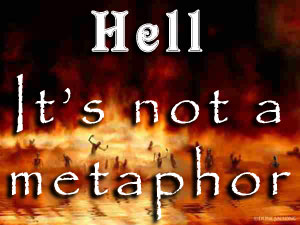Hebrews 6:1-3
New Bible studies and devotionals sent to your email. The first one includes a free gift!
Before you read: This article is part of a larger series that builds on itself from the foundation up, with each study building on the last. If something in this article does not make sense to you or if you believe it to be incorrect please be sure you have read over the entire course before passing your final judgment. Also be sure to visit this page’s FAQ And Objections Page
There are some ideas and misconceptions about hell that need to be addressed. To make God seem more “loving” many people have tried to say that God does not “punish” people. Or, at least, not by sending them to a literal place of fire and torment.
Instead, they like to say that God doesn’t force them to be in His presence, and that leaves no other place for them to go. This sounds so much better because it removes the question of, “how can a loving God send people to hell?” It replaces it with a loving God simply letting people walk away from Him.
Some also say that hell is not a literal place of torment, nor is it an eternal torment. They believe when the Bible speaks of flames and outer darkness it has to be speaking metaphorically. Because you can not have a fire without light. But, is hell real?
In this unit, we are going to address these issues specifically. We need to make it clear that God really does SEND people to hell. He doesn’t JUST tell them to depart from Him, and hell is NOT simply being separated from God’s presence.
One of the first objections to a real, physical place called hell is the belief that it is a metaphor. People believe that you can not take the Bible literally when it speaks of hell. But the question must be asked, how can we know when the Bible speaks literally and when it doesn’t?

If you remember from unit 1:7 we spoke about how we can understand the Bible. One of the issues we spoke of was knowing when to take something literally, or when to take it as a metaphor.
But to recap it very briefly, let me just tell you that the Bible will interpret itself if you read it. That means it will tell you when it is not speaking literally. The way you can know the difference is by reading the context of the words.
For example, if the things said or done in the verses are a part of a vision, dream, poem, or song then it may be metaphorical. If it the Bible literally tells you that the verses are a metaphor then it is metaphorical. Such as the case of some (not all) of the parables. However, if the Bible gives no indication that it is speaking metaphorically then it is speaking literally.
Now, obviously, there are times when something can be both a metaphor for something as well as literal. But even then you will find the scriptures giving clues about how to understand it. In other words, a fire doesn’t always have to be symbolic.
There are no scriptures that define hell or give any indication that it is a metaphor. It just tells us about a literal place of fire, torment, and darkness. The only argument one might make against this is that hell can not be both a place of fire and darkness. Thus it “must be a metaphor.”
But if you read the previous unit you already know that hell can be a literal place of darkness and fire at the same time. Still, I think it is important to make the case even stronger.
Matthew 25:41
41 Then shall he say also unto them on the left hand, Depart from me, ye cursed, into everlasting fire, prepared for the devil and his angels:
We understand and know fire as needing fuel. It breaks that fuel down and that produces heat and light. When the fuel is completely broken down the fire goes out.
In Matthew 25:41, Jesus tells us that this is an everlasting fire that was prepared for the devil and his angels.
This tells us 2 things.
1.) This fire either never runs out of fuel, or it doesn’t require fuel.
2.) This fire is effective torment for angels.
It is obvious that this isn’t the same type of fire that we know and understand. There is a place in scripture that we see a special type of fire similar to this.
Exodus 3:2-3
2 And the angel of the Lord appeared unto him in a flame of fire out of the midst of a bush: and he looked, and, behold, the bush burned with fire, and the bush was not consumed. 3 And Moses said, I will now turn aside, and see this great sight, why the bush is not burnt.

We see a bush on fire, yet it is not consumed. So we see a literal event where there was a fire that did not deplete its fuel. Meaning, it could last forever. Now, the flames of hell are obviously not like the fire we know. They may be more like this fire, which burned the bush but did not consume it.
God has created a flame for hell that would never consume its fuel. It may, therefore, also be dark. Because light is produced by fire through the consumption of fuel. But this fire does not consume its fuel. It is also effective enough to torment the angels.
So when we see scriptures that tell us, “the smoke of their torment goes up forever, and that they have no rest day nor night” we can know it is literal!
So the rules we know of for fire are not the same for this type of fire. It is still fire, though.
There is also another reason hell doesn’t “have” to be a metaphor because of the fire and light. You can have a fire in the dark. In fact, that is one of the greatest reasons to make a fire. You are still in the night, and darkness is all around you. So even if you have a fire going you are still in the darkness. The fire simply illuminates your immediate position. But you are still surrounded by dark.
So even if this specially designed fire does produce light it still doesn’t contradict what the Bible says about hell being “outer darkness.” You just have to understand that you can go into darkness, light a fire, and still have the dark all around you.
Have you ever been in a house that had no air conditioning in the middle of a desert heat wave? If not then you can’t even imagine it! Your eyes turn bloodshot, they are as red as a fire engine, and your whole face begins to look like you have a fever.
You begin to feel trapped, your breathing becomes difficult and shallow. Your mind turns to mush, and you can’t think right. You can’t sleep, but your body is completely void of all energy.

You begin to become angry for no reason, and you lash out at those around you. At some point you may even begin to thrash around trying to fight the heat, only to find that you can’t.
Your mouth becomes dry and your tongue sticks to the roof of your mouth, with a thick sticky mucus, that makes breathing harder.
Does that sound bad? Now add billions of people in that situation around you, clawing at themselves as well as you. Increase the heat to a level hot enough to torment an angel. By the way, in Revelation we see one standing in the Sun without a problem. Now take away your ability to die or feel less pain. Top it off with being able to see into heaven, talk with people there, but getting no help or pity.
Now, … all of this is very real. How should we live knowing this?
Hell is not simply a place void of God’s presence. It may seem easier to say that God will not force you to be in His presence. He is being “kind” enough to let you stay in a place where He doesn‘t exist. But what do the scriptures say?
Psalm 139:7-8
7 Whither shall I go from thy spirit? or whither shall I flee from thy presence? 8 If I ascend up into heaven, thou art there: if I make my bed in hell, behold, thou art there.
Job 26:6
6 Hell is naked before him, and destruction hath no covering.
Proverbs 15:11
11 Hell and destruction are before the Lord: how much more then the hearts of the children of men?
It should be very clear that these scriptures speak of God being everywhere, and that includes hell. But, do these verses contradict the following?
Matthew 25:41
41 Then shall he say also unto them on the left hand, Depart from me, ye cursed, into everlasting fire, prepared for the devil and his angels:
Isaiah 59:2
2 But your iniquities have separated between you and your God, and your sins have hid his face from you, that he will not hear.
These are the 2 verses often used to say that God simply doesn’t force people to be where He is. The only other place for them is in hell which, some say, is a place void of God.
But, upon closer examination, you can see that when God says “depart” from Him He is saying that He will have nothing to do with them. It doesn’t mean He is sending them to a place where He doesn’t exist.
To explain that a little bit better I think we should look at Isaiah 59:2. These people were separated from God, yet God was very much around them. The fact that they still had breath shows that God was still present. Without Him, there is no life and no existence.
So we see in scripture the principle that departing from God doesn’t mean you go to a place where He doesn’t exist. It just means He doesn’t have anything to do with you. His mercy will not be extended. So in a very real way, He withholds His face from us, while still being all around us.
Revelation 20:11
11 And I saw a great white throne, and him that sat on it, from whose face the earth and the heaven fled away; and there was found no place for them.
One may even wonder if the fire of hell is God Himself. Since the Bible says that He is a consuming fire. But that’s up for speculation and debate. Still, it’s an interesting thought to ponder.
I hope this has helped clear up any misconception that hell is a place without God. Because He is very much there.
Continue To Unit 2:8b – Would a Loving God Send Someone to Hell OR
Return To Christianity 101 Unit 2 – Sin and Eternal Judgment
August 31, 2015 at 5:53 pm | | 1 comment
thank you